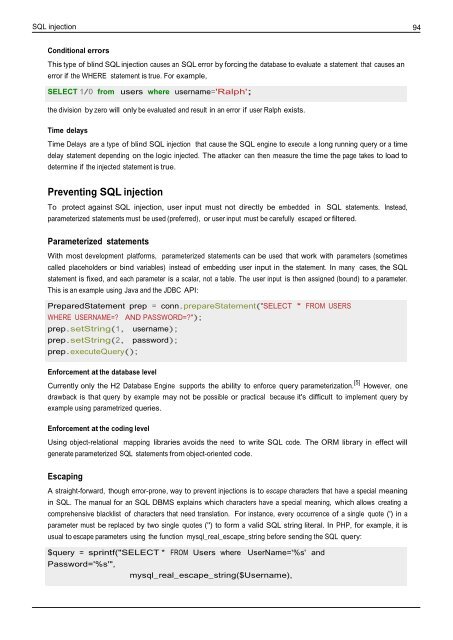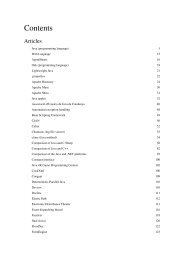Structured Query Language (SQL) - Cultural View of Technology
Structured Query Language (SQL) - Cultural View of Technology
Structured Query Language (SQL) - Cultural View of Technology
You also want an ePaper? Increase the reach of your titles
YUMPU automatically turns print PDFs into web optimized ePapers that Google loves.
<strong>SQL</strong> injection 94<br />
Conditional errors<br />
This type <strong>of</strong> blind <strong>SQL</strong> injection causes an <strong>SQL</strong> error by forcing the database to evaluate a statement that causes an<br />
error if the WHERE statement is true. For example,<br />
SELECT 1/0 from users where username='Ralph';<br />
the division by zero will only be evaluated and result in an error if user Ralph exists.<br />
Time delays<br />
Time Delays are a type <strong>of</strong> blind <strong>SQL</strong> injection that cause the <strong>SQL</strong> engine to execute a long running query or a time<br />
delay statement depending on the logic injected. The attacker can then measure the time the page takes to load to<br />
determine if the injected statement is true.<br />
Preventing <strong>SQL</strong> injection<br />
To protect against <strong>SQL</strong> injection, user input must not directly be embedded in <strong>SQL</strong> statements. Instead,<br />
parameterized statements must be used (preferred), or user input must be carefully escaped or filtered.<br />
Parameterized statements<br />
With most development platforms, parameterized statements can be used that work with parameters (sometimes<br />
called placeholders or bind variables) instead <strong>of</strong> embedding user input in the statement. In many cases, the <strong>SQL</strong><br />
statement is fixed, and each parameter is a scalar, not a table. The user input is then assigned (bound) to a parameter.<br />
This is an example using Java and the JDBC API:<br />
PreparedStatement prep = conn.prepareStatement("SELECT * FROM USERS<br />
WHERE USERNAME=? AND PASSWORD=?");<br />
prep.setString(1, username);<br />
prep.setString(2, password);<br />
prep.execute<strong>Query</strong>();<br />
Enforcement at the database level<br />
Currently only the H2 Database Engine supports the ability to enforce query parameterization. [5] However, one<br />
drawback is that query by example may not be possible or practical because it's difficult to implement query by<br />
example using parametrized queries.<br />
Enforcement at the coding level<br />
Using object-relational mapping libraries avoids the need to write <strong>SQL</strong> code. The ORM library in effect will<br />
generate parameterized <strong>SQL</strong> statements from object-oriented code.<br />
Escaping<br />
A straight-forward, though error-prone, way to prevent injections is to escape characters that have a special meaning<br />
in <strong>SQL</strong>. The manual for an <strong>SQL</strong> DBMS explains which characters have a special meaning, which allows creating a<br />
comprehensive blacklist <strong>of</strong> characters that need translation. For instance, every occurrence <strong>of</strong> a single quote (') in a<br />
parameter must be replaced by two single quotes ('') to form a valid <strong>SQL</strong> string literal. In PHP, for example, it is<br />
usual to escape parameters using the function mysql_real_escape_string before sending the <strong>SQL</strong> query:<br />
$query = sprintf("SELECT * FROM Users where UserName='%s' and<br />
Password='%s'",<br />
mysql_real_escape_string($Username),










